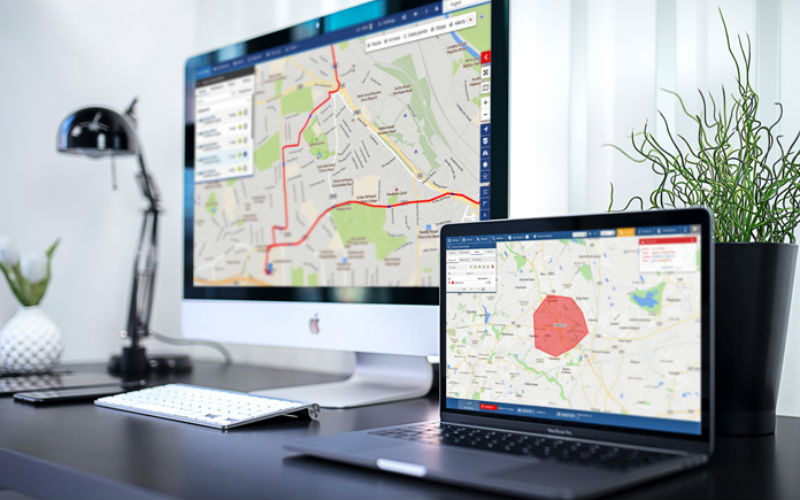All of our daily needs, from perishable food products to electronic devices, are transported to grocery stores, malls or warehouses by carefully planned logistics operations. Most people tend to think the process is very effortless; loading the products onto a ship, plane or a truck and deliver them to their destination.
However, large-scale transport and logistics operations are simply too complicated to manage without the right set of tools in today’s world. With hundreds, sometimes thousands of vehicles in the field, it is nearly impossible for a fleet manager to make the right decisions and last-minute changes unless they are well-informed. While fleet businesses don’t use pen and paper to keep logs or long-range radios to communicate with the drivers anymore; it doesn’t mean their job is any easier.
GPS technology has been a groundbreaking development for business industries that rely on transporting their good over long distances and monitor the condition of their vehicles as well as their assets. GPS-based fleet management systems have been so effective that business owners and executives were quick to adopt these innovative systems into their infrastructure to reap the benefits.
The powerful tools and features they bring to the table such as temperature monitoring and real-time locations tracking made these management systems a must-have for all companies with a vehicle fleet. Aberdeen Group recently published a study about the effectiveness of these advanced systems proving that fleet management systems are superior to every other solution on the market. According to their research, businesses that implemented fleet tracking systems have seen:
- 12% increase in profit margins
- 15% reduction in average travel time for job orders
- 10% decrease in overtime payments
- 28% increase in personnel compliance
- 13% reduction in fuel expenses
What is Fleet Management?
Regardless of the number of vehicles you have, managing a fleet is a challenging task. The term of fleet management encompasses the processes that fleet executives employ to supervise their vehicles and assets with the information at hand. Information flow is everything when it comes to making informed decisions about a logistics operation but staying informed about a vehicle fleet at every step of the way isn’t easy. That is unless you have cutting-edge tracking software that notifies fleet managers about important events, emergencies and other essential information.
Fleet management is an administrative process that allows companies to coordinate and organize their vehicle fleet to improve productivity, efficiency and resource allocation. From acquisition to delivery, there are a lot of moving parts in a logistics operation, but luckily for business owners, fleet management systems can help overcome any issues that can arise and improve the existing policies to increase overall productivity.
Theft Prevention and Asset Tracking
Warehouses, parking lots, construction sites and many other places like these are vulnerable against theft and tampering even with security guards patrolling 24/7. Professional criminals are nothing if not resourceful when it comes to planning and getting away with expensive machinery or valuable cargo onboard vehicles. The UK is responsible with 51% of the total number of thefts in Europe in 2020 with the biggest loss caused by an incident in which thieves attacked a vehicle and stole £8 million worth of computers and laptops in England.
With fleet management systems at their disposal, companies can take their security to the next level with effective security measures such as motion sensors, tampering alarms and various immobilization capabilities. Even if a thief manages to get past the safeguards, they won’t get far with a pair of eyes tracking their movements and reporting their location to the police. Vehicles and drivers will be safer than ever with instant event notifications, regular location updates and sensitive sensors on the lookout for suspicious activity.

Operational Efficiency
Even on the best day, managing a pool of fleet vehicles can be a monumental challenge. Vehicles breaking down en route to their destination, theft attempts on your vehicles or drivers causing unnecessary problems are well-known issues that affect the efficiency of transport operations. Most of these problems can be prevented or handled easily, but only if the fleet managers are well-informed and equipped with the right tools. At the end of the day, time is money, and the priority of a business is to maximize productivity through the use of vehicles, mobile assets and job hours.
It starts with reducing resource waste and eliminating unwanted driver behaviour which includes;
– Tracking the operational efficiency of vehicles and assets,
– Keeping up with preventive maintenance with the help of diagnostic reports,
– Preventing idling, overspeeding and other risky driver habits,
– Inefficient of use vehicles and assets to lower fuel waste.
Resource Management
Resource management is one of the essential cogs in the machine that is fleet management. Allocating resources efficiently requires information and tracking devices – with the help of GPS technology and sensors – provide a vast amount of information about the condition of vehicles, assets and driver behaviour. As an example, fuel costs can add up to 30% of all fleet expenses and this number can go even higher if you have a group of drivers causing excessive wear and tear on the vehicles or idling for extended periods. Fleet managers can detect and get ahead of these issues by analyzing the driver reports and maintenance cycles for the same type of vehicles. Companies can save thousands on fuel alone by introducing policies to improve driver behaviour and prevent vehicle breakdowns.
Fleet vehicles, fuel, drivers, tires, assets and countless other components in a transport operation are all resources that need to be managed diligently. Regardless of their size, all businesses have to run a tight ship on their resources to stay profitable and increase their ROI. GPS-based fleet management provides all the necessary information and tools to ensure that a fleet business is working at full capacity while they are using their resources at maximum efficiency.
Conclusion
A business is only as good as its ability to adapt and improve with the technological advances of their era. Fleet management systems allow business owners and fleet managers to control every aspect of their operations. Proper vehicle use, preventive maintenance, improved vehicle and driver safety are only a few of the countless benefits these modern management systems offer.
The integration of GPS-based fleet tracking solutions provides businesses with powerful tools that give them an edge over their competitors. Fleet managers can eliminate issues with productivity, security and maintenance by utilizing GPS and telematics data that can be accessed on-demand. With the help of systems that incorporate GPS-based applications and devices, businesses now have access to all necessary tools to optimize their operations, maximize their profits while keeping their vehicle fleet healthy and safe.



